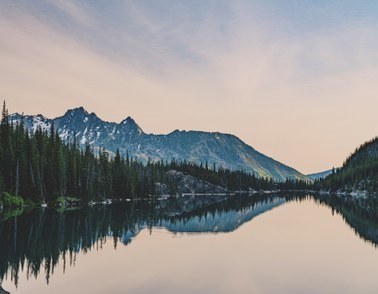Honoring Native Lands and Peoples
Native stories are largely missing from both historical and contemporary narratives of The Mountaineers and our legacy - something we are still grappling with today. One small way that we can begin to recognize and reflect on the fact that we are on Native land is through the process of land acknowledgment. Land acknowledgments recognize and respect Native peoples’ historical and ongoing stewardship of and connection to the land. They can be a first step toward repairing the harm and trauma historically endured by Native peoples.
Land acknowledgments are especially important for an outdoor organization like The Mountaineers, as our programs, courses, and trips occur on the ancestral lands of Native peoples. Our organizational land acknowledgment statement is meant to serve as a starting place for members of our community to shape their own personal acknowledgments.
Read on for educational resources that explore how we can develop deeper connections to the histories of our natural places, including pieces created in partnership with Sacred Lands Conservancy, an Indigenous-led nonprofit with strong ties to the Lummi Nation. For even more resources, visit our virtual education center. Thank you for being on this important journey of learning with us.

In the Spirit of Right and Respectful Relations: Conversations about Indigenous Ways of Knowing and Being in Nature
Learn about the newest project from Braided River, the conservation imprint of Mountaineers Books, which elevates ancestral knowledge to empower and inspire Indigenous-led environmental action and educate non-Indigenous partners and allies.

Caught Between Two Fires: A Native Perspective on Outdoor Leadership and Education
In this feature from Mountaineer magazine, hear from Dennis Eller about the importance of Native American perspectives, stories, and practices in outdoor leadership and education.

The Many Faces of a Mountain: Sharing Importance and Meaning Behind Indigenous Place Names
Our partners at Sacred Lands Conservancy share perspectives and stories about the history and meaning of Indigenous place names, with focus on two of our region’s mountains. We offer this piece as a resource to support our community’s efforts to learn about, respect, and honor the rights and connections of Native peoples to the lands we love, our shared home.

Learning About Native History and Culture: Reflections from Indian Country 101
Our Advocacy and Engagement Manager shares reflections from the Indian Country 101 online tribal engagement training series. Designed for practitioners of tribal engagement in the natural resources space, this course is a valuable resource for all who wish to learn about Native history, culture, and tribal governments in Washington state and beyond.

We Are All Treaty People: Part II
In this second part of a two-part blog series on tribal treaties of the Pacific Northwest, our partners at Sacred Lands Conservancy share how tribal treaties are interpreted, how they affect our lives today, and how we can all work to respect and uphold our collective treaty obligations. We are all treaty people, and we offer this piece as a resource to support our community’s efforts to learn about, respect, and honor the rights and connections of Native peoples to the lands we love.

We Are All Treaty People: Part I
In this first part of a two-part blog series on regional tribal treaties, our partners at the Sacred Lands Conservancy share important history and context pertaining to the treaties that allow us to live, work, and recreate on the lands and waters of the Pacific Northwest. We are all treaty people, and we offer this piece as a resource to support our community’s efforts to learn about, respect, and honor the rights and connections of Native peoples to the lands we love.

Walking the Walk: Action Beyond Land Acknowledgement
In this feature from Mountaineer magazine, guest contributor Tah-Mahs Ellie Kinley and Sacred Lands Conservancy share how we can all take action beyond acknowledgment, including by practicing gratitude, generosity, and humility while recreating on the traditional lands of Indigenous peoples.

This Land: An Indigenous Perspective on Land Acknowledgment
We’re partnering with the Sacred Lands Conservancy, an Indigenous-led nonprofit with strong ties to the Lummi Nation, on a series of educational pieces about how to develop deeper connections to the histories of our natural places. In this first installment of a three-part blog series, Lhaq’temish fisherwoman and enrolled Lummi Nation tribal member, Tah-Mahs Ellie Kinley, unpacks the practice of land acknowledgment and how you can acknowledge the land in a meaningful and impactful way.

Going Beyond Land Acknowledgments
Last month, we announced The Mountaineers Native land acknowledgment statement. Land acknowledgment is only a first step: read on for more information about how The Mountaineers seeks to honor Native land and peoples.

Announcing The Mountaineers Land Acknowledgment Statement
Land acknowledgments are a first step towards better honoring Native lands and peoples. Learn about our process of developing The Mountaineers land acknowledgment statement, and our commitment to showing respect, appreciation, and support for Native communities.
